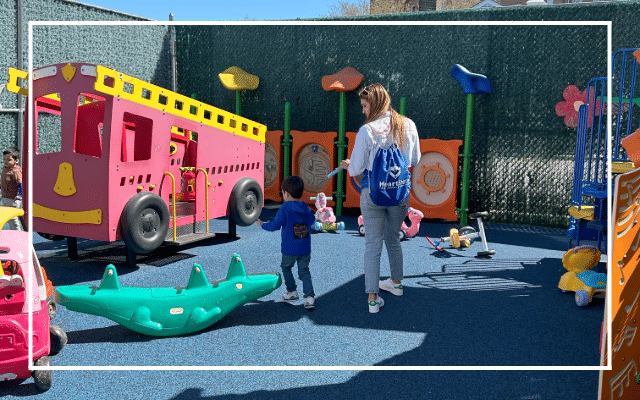News and Events
At HeartShare, we believe in keeping you aware of news and events throughout the agency. Be sure to visit our Events Calendar for important upcoming dates that may be of interest to you.
Supporting a Child With Autism in the Classroom
May 24, 2024
Celebrations, Community, Disability Rights, Families, School, Thought Leadership
Supporting a Child With Autism in The Classroom
By Lily Robinson –
Can you introduce yourself and tell us how long you’ve been here working with HeartShare?
CR: Hi, my name is Christina Rodriguez. I’ve been a Special Education Teacher in one of HeartShare’s Early Childhood Education programs since 2020.
Where did your desire to start teaching come from?
CR: I was in the medical field initially, but then I switched it up and started working as a Teaching Assistant. Once there, I realized I liked this. I’m going to go back to school. I always had teaching in my mind as a little girl. I would play with my dolls and pretend to be a teacher, singing the ABCs. But what really got me into special education was my son. My son is autistic, and working with the children here at the preschool helped me learn more about the cause. My son was diagnosed at three years old. He’s now 13. So, working with these kids reminds me of my son.
How would you help someone who has never heard of the term autism understand its complexities?
CR: It’s just a diagnosis. The child is still a child but with a bit of a delay. It can take a lot of patience and work, but they will get there.
Since autism is a spectrum, how is it to work in a classroom of students with different abilities?
CR: I’ve learned that each child works differently, but I try to have a structured classroom. We have a routine so the children know what to do when they come in. They put their backpacks in the cubby, wash their hands, and start at the center table every day. We keep a tight routine because it can become overwhelming for them if you mix up too much. We also use a lot of visuals to show them what’s coming up next in their day.
What’s the most challenging part of running a classroom?
CR: It’s not hard at all. I have a fantastic team that communicates well, and the classroom will run once you have a great team.
How can parents support their child with special needs at home?
CR: Routine. With my parents, I send home a list of what we do in the classroom, such as how we use the potty. This helps the kids feel more prepared.
What’s your favorite part of being part of the special education community?
CR: I love the children. Every time they accomplish something, you see them. It’s like we did this! When the kids first come in, they don’t necessarily know how to play and interact, but they’re much more confident when they graduate and leave. It’s so rewarding.
What would you say to a parent considering HeartShare for their child’s education journey?
CR: Don’t be scared. We’re very open and friendly here. And I feel like a lot of our staff here are mothers. So we work a lot with that motherly instinct.
What do you wish people knew about children on the autism spectrum?
CR: Just approach them like any other kid. Don’t be aggressive. Take your time.
Once students finish the preschool program, where do they go next in their education journey?
CR: Depending on the student, they might attend another specialized program like The HeartShare School or integrate into a public school setting. No matter where they go, it can feel like a whole different world because they’re so used to being here and having this routine. Meeting new people and students can be a lot for them, but I think we do a great job of setting them up for success wherever they go.
Is there anything else you want to share about the program or your students?
CR: I really enjoy working here, and I love my students so much. I often say that from 8:00 a.m. to 3:00 p.m., these are my kids, and I’m responsible for them.
Are there any early signs of autism that parents can look out for in their child?
CR: No eye contact or poor eye contact. There can be a lot of repetitive behaviors like tip-toeing or flapping. It can also show in how they play and socialize with others.
What recommendations would you give to parents who might suspect their child is on the autism spectrum?
CR: I suggest having your child evaluated. It never hurts to find out because it could be something else, like a speech delay. You never know unless you get evaluated and speak to your doctor.
Share
Website Footer
 Donate
Donate
Sign up for our newsletter

Click this logo to support HeartShare every time you shop at Amazon. For all eligible purchases, the AmazonSmile program donates 0.5 percent of the price to HeartShare.
Website by Manoverboard Inc.


